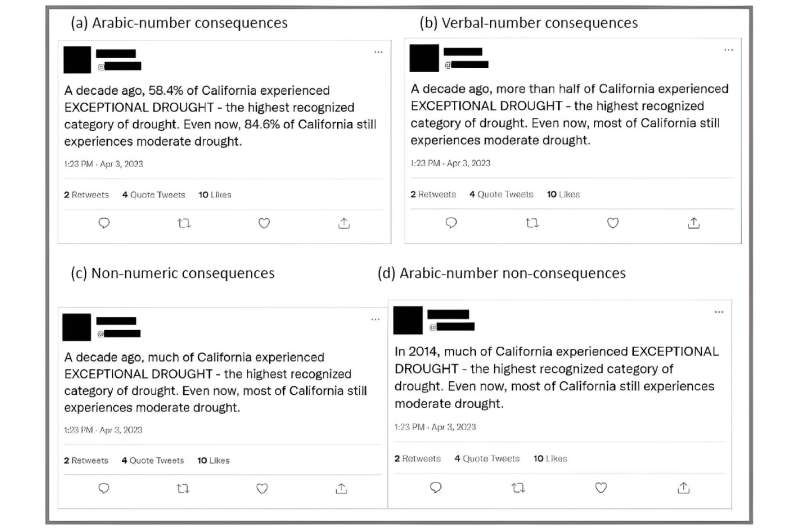University of Oregon researchers and their colleagues created four types of tweets to compare user engagement with numerical and non-numerical presentations of climate science information. Credit: University of Oregon
The idea of presenting hard numbers like “90%” with words like “almost all” can help make science and math more accessible, but new research shows that’s not the way to go. the best way to introduce people online.
Researchers from the University of Oregon, Michigan State University and Ohio State University found that people are more likely to share and trust social media posts with numbers than those without. The researchers looked specifically at tweets and Reddit posts related to climate change, one of the most pressing issues that require the use and discussion of numerical data. said Ellen Peters, director of the UO’s Center for Science Communication Research.
“Most of the American public now believes that climate change is real and happening, but what’s missing are people who are dealing with it and understanding what actions can be taken,” said Peters. “Social media is one of the places where the public and scientists can come together and learn from each other.”
When Peters and his team analyzed tweets from nearly 1,500 climate scientists, only 23 percent of the posts contained numbers. However those few numeric tweets were more likely to be shared than non-numeric tweets.
That suggests climate communicators may be underestimating the power of numerical data to improve knowledge of current environmental issues, said David Markowitz, a former assistant professor of social media analytics in the UO’s School of Journalism and Communication.
Markowitz, now an assistant professor at Michigan State University, said: “Numbers can be intimidating and scary, but people don’t avoid them. “Our results show that people interact with numbers, and that It is very encouraging for journalists or scientists in the field of climate change who want to know the best ways to get involved in the community.”
The researchers describe their findings in a paper published on July 23 in the journal PNAS Nexus.
Previous studies have shown that people trust messages from doctors and journalists more when there is a number. In fact, Peters recently found that people are more likely to want to get vaccinated if they are shown a mathematical probability of side effects. He wondered if providing data-driven communications could also bring commitment to the climate crisis.
Peters and his team scraped data from social media platform X, then known as Twitter, and Reddit and analyzed more than 8 million tweets and posts and comments from 17,000 related to climate change. They found that posts with numerical information had greater engagement, with 16.9 percent more retweets on X and 31.7 percent more on Reddit than those without.
However, the researchers were surprised to find that the same tweets were liked 5.2 percent more often. At first they expected likes to grow in the same way as retweets and votes and became curious when they saw the opposite. To uncover some of the psychology of sharing and liking a post, researchers conducted the following study.
They created four types of tweets describing the effects of climate change, with posts containing a precise number (e.g., “58.4 percent”), a statistical description (“more than half”), a descriptive non-mathematical (“most of”) or a non-scientific number (“year 2014”).
Study participants were assigned to read 20 tweets from one of four categories. As expected, participants were more likely to re-share and trust tweets with a positive number but were less likely to like them. In the survey, most participants thought that digital tweets were accurate, clear and interesting, but they also felt that they did not like them.
Peters speculated that the environmental disaster being conveyed in the tweets could be the reason why people did not click “like” on them, especially since X uses the heart symbol to represent the things he does. love Negative emotions like climate anxiety and fear, however, can be crippling, Peters said. He advises that messages about environmental disasters include not only hard facts but also possible solutions that build confidence and help people overcome climate apathy.
Climate talks shouldn’t involve numbers for the sake of having them, Peters notes. Instead, figures should be presented thoughtfully and packaged in a way that is easy to understand and relevant to the audience. For example, when defining the number of inches of sea level rise, Peters suggested identifying key areas that would be affected, such as whether a local restaurant might be at risk of collapsing.
“Present numerical data in an experiential way so that people can feel the numbers more,” he said.
Peters believes that harnessing the neglected power of communicating with numbers can undermine the long-term trust between science and society.
“People should be allowed to see the data if they want it,” he said. “And over time, maybe we’ll increase the public’s ability to use and be comfortable with math. That’s what I hope.”
Additional information:
Ellen Peters et al, Numeric social-media posts include people with climate science, PNAS Nexus (2024). DOI: 10.1093/pnasnexus/pgae250
Offered by the University of Oregon
Excerpt: Converging numbers boost confidence in climate change science, research suggests (2024, July 26) retrieved July 27, 2024 from https://phys.org/news/2024-07 -communicating-boosts-climate-science.html
This document is subject to copyright. Except for any legitimate activity for the purpose of private study or research, no part may be reproduced without written permission. Content is provided for informational purposes only.
#Converging #numbers #boost #confidence #climate #change #science #research #suggests

